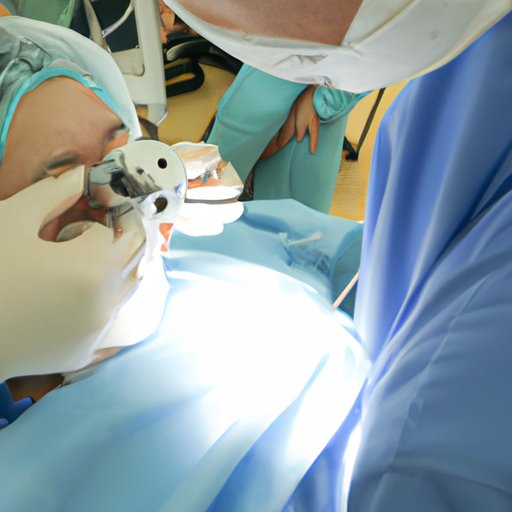Introduction
Cataract surgery is one of the most commonly performed surgeries in the United States. It involves replacing the clouded lens of the eye with an artificial intraocular lens (IOL). The goal of cataract surgery is to improve vision and reduce the risk of complications associated with cataracts. While the procedure is generally safe, it is important to understand the anesthesia options available and what to expect when undergoing cataract surgery.

What to Expect When Undergoing Cataract Surgery
Before undergoing cataract surgery, patients will be given pre-operative instructions by their doctor. These instructions may include avoiding certain medications prior to surgery, such as aspirin or ibuprofen. Patients should also make sure they have someone available to drive them home after the procedure.
During the cataract surgery process, the surgeon will use a small device called a phacoemulsifier to break up the cloudy lens of the eye and remove it. A new IOL will then be inserted in its place. The entire process typically takes less than 30 minutes.
After cataract surgery, patients will need to follow post-operative care instructions provided by their doctor. This may include using antibiotic eye drops for several weeks and wearing sunglasses to protect the eyes from bright light. Patients should also avoid strenuous activities for at least a few days after surgery.

Understanding the Benefits of Being Awake During Cataract Surgery
Many people may wonder if it is possible to stay awake during cataract surgery. The answer is yes – it is possible to stay awake during the procedure. There are several benefits to staying awake during cataract surgery, including increased comfort, reduced risk of complications, and the ability to provide feedback to the surgeon.
When patients are awake during cataract surgery, they can experience the procedure firsthand and provide feedback to their surgeon if needed. This can help ensure that the procedure is going as planned and can potentially reduce the risk of complications. Additionally, being awake during cataract surgery can also help to reduce anxiety and increase comfort. As a result, many patients opt to stay awake during the procedure.
A Guide to the Cataract Surgery Process: Staying Awake or Not
When deciding whether to stay awake or not during cataract surgery, it is important to consider the pros and cons. On one hand, staying awake during cataract surgery can provide a more comfortable experience and allow patients to provide feedback to their surgeon. On the other hand, some patients may feel more relaxed under sedation and may prefer to sleep through the procedure.
If a patient decides to stay awake during cataract surgery, they may be given a mild sedative to help them relax. The sedative will cause the patient to feel drowsy but will not put them to sleep. Additionally, the patient may also be given local anesthetic to numb the area around the eye.
Is It Safe to Stay Awake During Cataract Surgery?
Staying awake during cataract surgery is generally considered safe, as long as the patient is in good health and able to follow instructions. During the procedure, the surgeon will take measures to ensure the safety of the patient, such as monitoring vital signs and providing oxygen. However, there are some potential risks associated with staying awake during cataract surgery, such as increased anxiety or the possibility of movement during the procedure.
It is important to discuss the risks and benefits of staying awake versus sleeping during cataract surgery with your doctor before making a decision. Your doctor will be able to provide guidance and advice based on your individual situation.
Conclusion
Cataract surgery is a safe and effective procedure for improving vision. It is possible to stay awake during cataract surgery, which can provide increased comfort and the ability to provide feedback to the surgeon. However, it is important to consider the potential risks associated with staying awake, as well as the benefits of sedation. Ultimately, the decision to stay awake or not during cataract surgery should be made in consultation with your doctor.
(Note: Is this article not meeting your expectations? Do you have knowledge or insights to share? Unlock new opportunities and expand your reach by joining our authors team. Click Registration to join us and share your expertise with our readers.)
